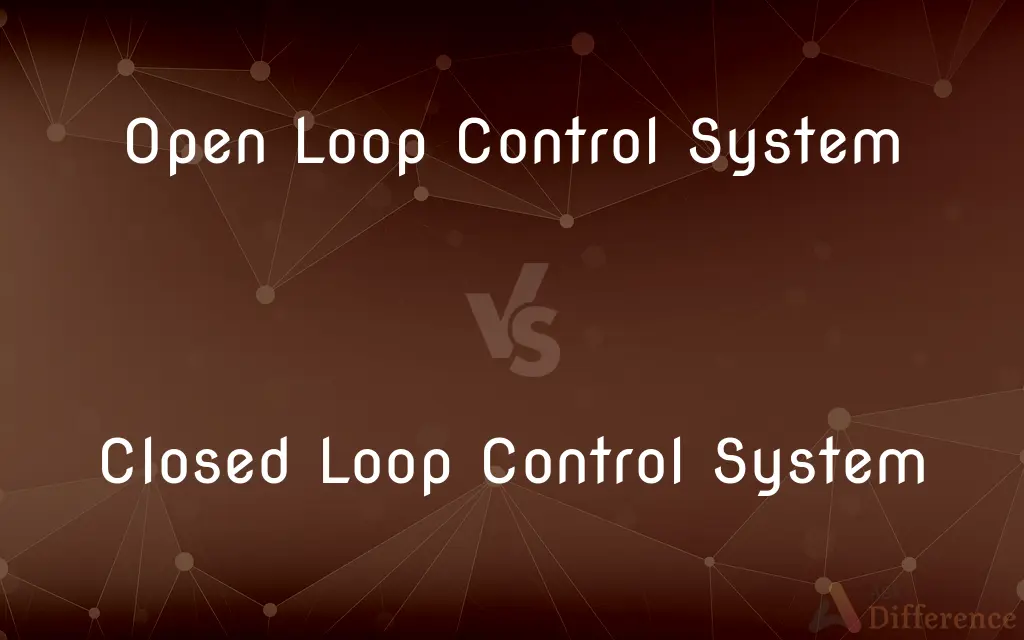Open Loop Control System vs. Closed Loop Control System — What's the Difference?
By Tayyaba Rehman — Published on January 12, 2024
Open Loop Control System operates without feedback, using predefined settings. Closed Loop Control System uses feedback to adjust its operation and maintain desired output.

Difference Between Open Loop Control System and Closed Loop Control System
Table of Contents
ADVERTISEMENT
Key Differences
An Open Loop Control System operates on a predefined set of instructions or settings without using feedback to adjust its performance. It performs its designated function based solely on the input it receives and the pre-established parameters. In contrast, a Closed Loop Control System, also known as a feedback control system, continually monitors its output and adjusts its operations based on this feedback to maintain the desired output level.
The lack of feedback in an Open Loop Control System means it cannot correct any errors or disturbances that might occur during its operation. This can lead to less accurate and less consistent performance compared to a Closed Loop System. Closed Loop Systems constantly adjust their performance based on feedback, which allows them to correct any deviations from the desired outcome, leading to more accurate and reliable operation.
Open Loop Systems are generally simpler and less expensive than Closed Loop Systems. They are easier to design and maintain due to their straightforward operation mechanism. However, Closed Loop Systems, despite being more complex and costly, offer greater precision and efficiency, making them suitable for applications where accuracy and response to changing conditions are critical.
In terms of application, Open Loop Systems are often used in situations where the output does not need to be precisely controlled or where the input conditions are stable and predictable. Examples include electric toasters and washing machines. Closed Loop Systems are employed in more complex scenarios like automatic climate control in buildings or cruise control in vehicles, where continuous adjustments are necessary to achieve and maintain the desired outcome.
Finally, the choice between an Open Loop and a Closed Loop System depends on the specific requirements of the application, including the need for accuracy, the predictability of operating conditions, and cost considerations. While Open Loop Systems are adequate for simple, routine tasks, Closed Loop Systems are essential for more sophisticated, dynamic applications.
ADVERTISEMENT
Comparison Chart
Feedback Mechanism
Operates without feedback.
Uses feedback to adjust operations.
Error Correction
Cannot correct errors automatically.
Corrects errors based on feedback.
Complexity and Cost
Simpler and less expensive.
More complex and costly.
Precision
Less precise, suitable for predictable tasks.
More precise, adaptable to changing conditions.
Typical Applications
Simple appliances, routine tasks.
Complex machinery, critical processes.
Compare with Definitions
Open Loop Control System
An Open Loop Control System operates based on predetermined settings.
The home heating system worked on an open loop, turning on at set times regardless of room temperature.
Closed Loop Control System
Suitable for applications where response to change is crucial.
The autopilot system in aircraft is a closed loop, constantly adjusting to maintain the set course.
Open Loop Control System
It does not use feedback to adjust its operation.
The automatic car wash operated in an open loop, following a fixed sequence of wash cycles.
Closed Loop Control System
A Closed Loop Control System uses feedback to maintain the desired output.
The building's HVAC system used a closed loop to adjust temperatures based on real-time readings.
Open Loop Control System
It cannot compensate for external disturbances or changes.
The streetlights operated on an open loop, turning on at sunset regardless of actual light conditions.
Closed Loop Control System
More complex and precise than Open Loop Systems.
The industrial robot arm used a closed loop system for precise movement control.
Open Loop Control System
Ideal for applications with predictable and stable conditions.
The conveyor belt in the factory was controlled by an open loop system for consistent speed.
Closed Loop Control System
It continuously monitors and adjusts its performance.
The car's cruise control, a closed loop system, adjusted speed based on road conditions.
Open Loop Control System
Open Loop Systems are simpler and often more cost-effective.
The basic irrigation system used an open loop to water the garden at the same time daily.
Closed Loop Control System
Can correct errors or disturbances in real time.
The automated manufacturing line had a closed loop system to correct errors in assembly immediately.
Common Curiosities
What is an Open Loop Control System?
An Open Loop Control System operates without feedback, following predefined settings.
Can Open Loop Systems adjust to environmental changes?
No, they cannot adjust automatically to environmental changes or disturbances.
Where are Open Loop Systems commonly used?
In simple appliances and routine tasks where precision is not critical.
Do Closed Loop Systems require more maintenance than Open Loop Systems?
Typically, yes, due to their more complex nature.
How do Closed Loop Systems maintain accuracy?
By constantly monitoring output and making adjustments based on feedback.
Are Open Loop Systems more cost-effective than Closed Loop Systems?
Generally, yes, due to their simpler design and operation.
What makes Closed Loop Systems more complex?
The need for continuous monitoring and adjustment mechanisms adds to their complexity.
What is a Closed Loop Control System?
A Closed Loop Control System uses feedback to continuously adjust its operation for the desired output.
Is a thermostat an example of a Closed Loop System?
Yes, as it adjusts heating or cooling based on temperature feedback.
Can Open Loop Systems be converted to Closed Loop Systems?
It's possible, but it requires adding feedback mechanisms and control logic.
Do Open Loop Systems provide less control over the process?
Yes, they provide less control as they cannot adjust to changing conditions or errors.
Why might someone choose an Open Loop System?
For its simplicity, lower cost, and sufficiency in stable, predictable conditions.
What applications are Closed Loop Systems best suited for?
In complex, dynamic environments where precision and adaptability are essential.
Can Closed Loop Systems operate autonomously?
Yes, they can operate with minimal human intervention, adjusting automatically.
Are Closed Loop Systems more energy-efficient than Open Loop Systems?
Often, yes, because they can adjust operations to use only necessary energy.
Share Your Discovery

Previous Comparison
McAfee vs. Kaspersky
Next Comparison
Joint Venture vs. Strategic AllianceAuthor Spotlight
Written by
Tayyaba RehmanTayyaba Rehman is a distinguished writer, currently serving as a primary contributor to askdifference.com. As a researcher in semantics and etymology, Tayyaba's passion for the complexity of languages and their distinctions has found a perfect home on the platform. Tayyaba delves into the intricacies of language, distinguishing between commonly confused words and phrases, thereby providing clarity for readers worldwide.
















































